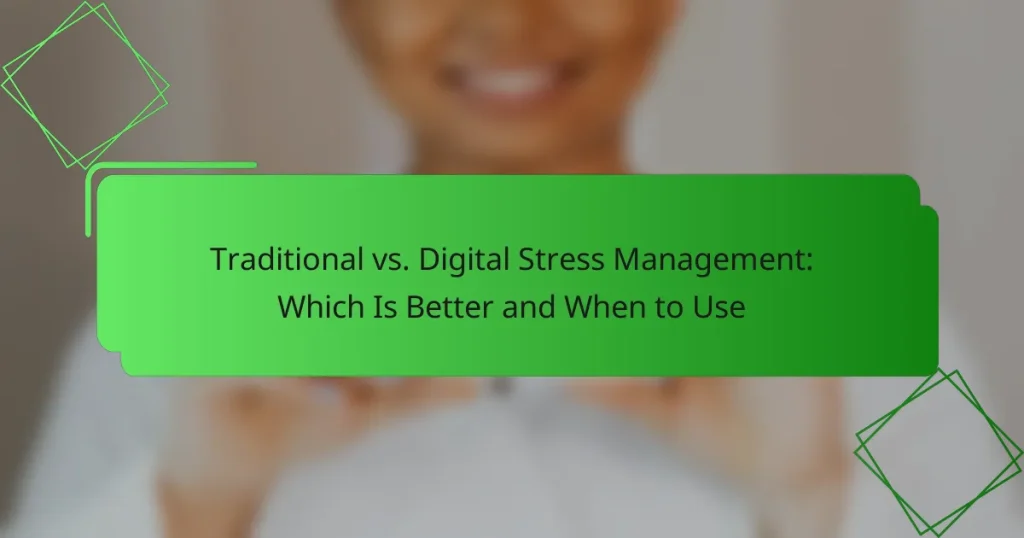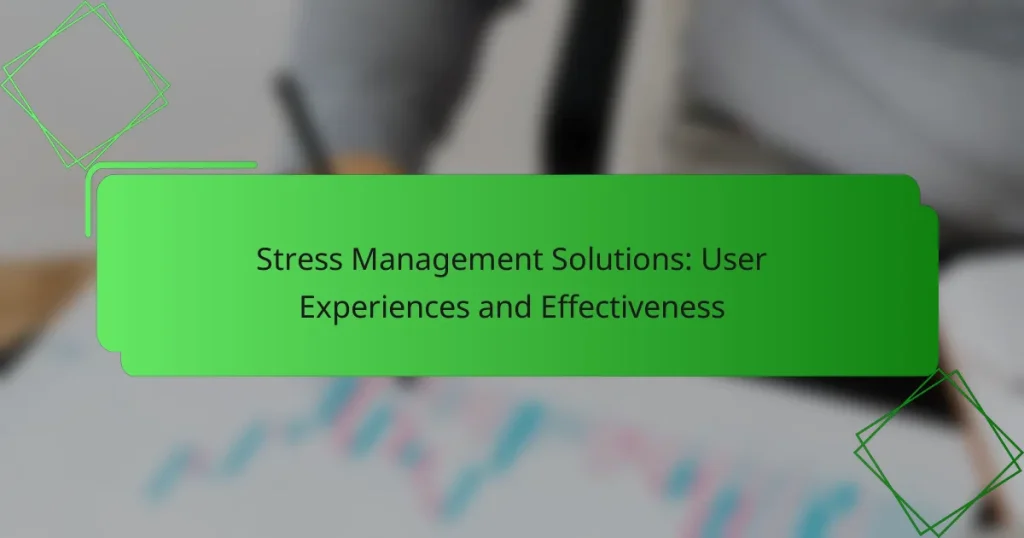Digital wellness tools offer innovative solutions for stress management, providing users with accessible resources to enhance relaxation and mindfulness. With features like guided meditations, relaxation techniques, and personalized plans, these applications empower individuals to develop effective coping strategies and reduce anxiety. By prioritizing usability and community support, users can engage more deeply and stay motivated on their journey to improved mental well-being.
Traditional vs. Digital Stress Management: Which Is Better and When to Use
Stress Management Solutions for Athletes: Finding the Right Approach and Techniques
Diversity in Stress Management Techniques: Evaluation for Corporate Wellness
Stress Management Tools: Unique Techniques for Busy Professionals
Stress Management Solutions: User Experiences and Effectiveness
Stress Management Solutions: Choosing the Right Fit for Your Lifestyle
What are the best digital wellness tools for stress management?
The best digital wellness tools for stress management include applications that provide guided meditations, relaxation techniques, and professional support. These tools can help users develop coping strategies, improve mindfulness, and reduce anxiety through structured programs and resources.
Headspace
Headspace is a popular meditation app that offers guided sessions tailored for stress relief. Users can choose from various topics, including anxiety, sleep, and focus, with sessions ranging from just a few minutes to longer practices. The app also features animations that explain mindfulness concepts, making it accessible for beginners.
Consider using Headspace’s daily meditations to build a consistent practice. The app’s user-friendly interface and engaging content can help you stay motivated and track your progress over time.
Calm
Calm is another leading app focused on relaxation and stress management, featuring a wide range of guided meditations, sleep stories, and soothing music. Users can select specific themes such as stress relief or mindfulness, with sessions varying in length to fit different schedules.
To maximize the benefits of Calm, try incorporating its sleep stories into your nighttime routine. This can help you unwind and improve sleep quality, which is essential for managing stress effectively.
Insight Timer
Insight Timer is a free meditation app that offers a vast library of guided meditations and talks from various teachers around the world. Users can explore different styles and lengths, making it easy to find sessions that suit their needs and preferences.
Take advantage of Insight Timer’s community features, such as groups and discussions, to connect with others on similar journeys. This can provide additional support and motivation as you work on your stress management skills.
BetterHelp
BetterHelp is an online therapy platform that connects users with licensed therapists for virtual counseling sessions. This service can be particularly beneficial for those dealing with significant stress or anxiety, as it provides professional support from the comfort of home.
When using BetterHelp, consider your specific needs and preferences in a therapist. The platform allows you to filter by specialties, ensuring you find someone who understands your unique challenges.
Sanvello
Sanvello is a mental health app that combines self-care tools, therapy, and community support to help users manage stress and anxiety. It offers mood tracking, guided meditations, and cognitive behavioral therapy (CBT) techniques, making it a comprehensive resource for mental wellness.
Utilize Sanvello’s mood tracking feature to identify patterns and triggers related to your stress. This can help you develop more effective coping strategies and enhance your overall mental health.
How do digital wellness tools improve stress management?
Digital wellness tools enhance stress management by providing accessible resources that promote relaxation and mindfulness. These tools often incorporate features like guided meditation, progress tracking, and personalized plans to help users effectively manage their stress levels.
Guided meditation
Guided meditation is a popular feature in many digital wellness tools, offering users structured sessions led by experienced instructors. These sessions can range from a few minutes to over an hour, catering to different schedules and preferences.
Using apps or online platforms, individuals can choose meditations focused on specific goals, such as anxiety reduction or improved sleep. Regular practice can lead to noticeable improvements in overall well-being and stress resilience.
Progress tracking
Progress tracking allows users to monitor their stress management journey over time. Many digital wellness tools include features that log meditation sessions, mood changes, and stress levels, providing insights into patterns and progress.
By visualizing their data through graphs or summaries, users can identify what techniques work best for them. This awareness can motivate continued use and help adjust strategies as needed for optimal stress management.
Personalized plans
Personalized plans tailor stress management strategies to individual needs and preferences. Many tools use questionnaires or assessments to create customized routines that align with users’ lifestyles and stress triggers.
These plans may include a mix of meditation, physical activity, and breathing exercises, ensuring a comprehensive approach. Users should regularly review and adjust their plans to maintain effectiveness and address changing circumstances.
What features should I look for in stress management apps?
When selecting stress management apps, prioritize features that enhance usability and effectiveness. Key elements include a user-friendly interface, diverse content types, and community support to foster engagement and motivation.
User-friendly interface
A user-friendly interface is crucial for stress management apps, as it ensures that users can navigate the app easily without frustration. Look for intuitive designs that allow for quick access to features such as guided meditations, mood tracking, and relaxation exercises.
Consider apps that offer customizable settings, enabling you to tailor the experience to your preferences. Features like dark mode, adjustable font sizes, and simple navigation can significantly enhance usability.
Variety of content
Apps should provide a variety of content to effectively address different aspects of stress management. This can include guided meditations, breathing exercises, educational articles, and interactive activities. A diverse range helps cater to individual preferences and needs.
For example, some users may benefit from audio sessions, while others might prefer written resources or video tutorials. Look for apps that regularly update their content to keep users engaged and provide fresh insights.
Community support
Community support can enhance the effectiveness of stress management apps by providing a sense of belonging and shared experience. Many apps now include forums, chat features, or social media integration, allowing users to connect with others facing similar challenges.
Engaging with a community can motivate users to stick with their stress management routines. Consider apps that facilitate group challenges or offer peer support options, as these can foster accountability and encouragement.
How much do digital wellness tools cost?
Digital wellness tools vary in cost, typically ranging from free options to monthly subscriptions or one-time purchases. Users should consider their budget and the features they need when choosing a tool.
Subscription models
Many digital wellness tools operate on a subscription basis, charging users monthly or annually. Prices can range from around $5 to $30 per month, depending on the features offered, such as personalized plans, coaching, or advanced analytics.
When opting for a subscription, look for features that align with your wellness goals. Some platforms offer tiered pricing, allowing you to choose a plan that fits your needs and budget.
Free trials
Free trials are a common way to explore digital wellness tools without financial commitment. Most platforms offer trials lasting from a week to a month, allowing users to test features and usability.
Take advantage of these trials to assess if the tool meets your expectations. Be mindful of cancellation policies to avoid unexpected charges once the trial period ends.
One-time purchases
Some digital wellness tools are available as one-time purchases, typically ranging from $10 to $100. These may include apps or software that do not require ongoing fees.
One-time purchases can be cost-effective if you prefer not to commit to a subscription. However, ensure that the tool provides sufficient updates and support to remain useful over time.
What are the benefits of using digital wellness tools in urban areas?
Digital wellness tools offer significant advantages for stress management in urban areas, including enhanced accessibility and tailored solutions. These tools can help individuals cope with the unique stressors of city living, such as noise, crowding, and fast-paced lifestyles.
Accessibility
Digital wellness tools are easily accessible through smartphones and computers, making them convenient for urban dwellers. Many apps and platforms are available for free or at a low cost, allowing users to engage in stress management techniques without significant financial investment.
These tools often provide a range of features, including guided meditations, stress tracking, and community support. Users can access resources anytime and anywhere, which is especially beneficial for those with busy schedules or limited time for in-person therapy sessions.
To maximize the benefits of these tools, consider exploring multiple options to find the best fit for your needs. Look for apps that offer personalized recommendations and user-friendly interfaces to enhance your experience.






